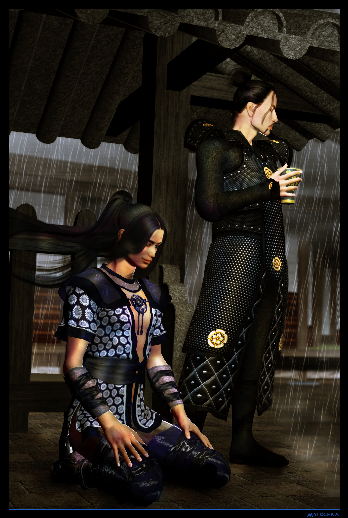

The next day, it rained. Despite a delightful night with Kitsumo, Nobunaga was in a foul mood. He had planned for some archery practice, but while he was content to fight battles in the rain, practicing in the damp was not the entertainment he had wished for.
He stood at the doorway to the courtyard, glowering. “The heavens conspire against me,” he muttered.
Ranmaru, kneeling beside him, glanced up at him. “They would not dare, my lord,” he said.
Nobunaga gave a small snort of grudging laughter. “One would think not, yes, my boy?”
The valet smiled and nodded.
“Yet it rains when I wish sunshine.”
“The gods do seem contrary today,” Ranmaru agreed.
Nobunaga growled and took a breath, but before the “Ranmaru, wine,” was even on his lips, a servant approached with a cup. With a grunt of acknowledgement, he took it, sipping the rich red liquid.
“What else is there to do today, my boy?” he asked.
“Lord Mitsuhide wishes to speak with you concerning the western Mori,” Ranmaru answered.
“Does he now?” Nobunaga returned. “No doubt he chafes at being placed under the monkey’s command.”
“He fails to see the purpose behind it, I think,” the valet replied carefully. “He knows himself to be the better warrior.”
“Which is why he and not Hideyoshi provides the arms,” Nobunaga countered crossly. He glanced down at Ranmaru. “And what do you think, Ranmaru?”
“I admire your wisdom, as always, my lord,” the boy replied. Then he turned his head and rose gracefully to his feet. “Lord Mitsuhide, my lord,” he said.
Nobunaga turned, draining his cup of wine as his retainer approached. Ranmaru gave a respectful bow, and stepped back so that he was behind his lord.
“Good morning to you, my Lord Nobunaga,” Mitsuhide said, ignoring, as usual, the valet’s presence.
“Hardly good, Mitsuhide,” the great lord replied, and added, after less than a moment’s pause, “Well?”
“I wished to confer with you regarding this new western campaign, my lord,” the younger man said with just the right touch of deference.
“What wisdom do you have to offer me, Mitsuhide?”
“I trust you will not see fit to deal with the Honganji as you did with the Heieji, my lord.”
Ranmaru winced as Nobunaga frowned. “Do you harp on that still, Mitsuhide?” he said, his voice low. “The warrior-monks at Heie chose their fate. To rise up against their rightful lord…”
“I understand, Lord Nobunaga,” Mitsuhide broke in, and Ranmaru stifled his gasp. “But I will hold my own counsel on the necessity of murdering them all.”
“Will you now?” Nobunaga returned, and his face became a mask of fury. “Hold it, then, my lord Akechi!”
Mitsuhide’s face, too, became dark, but he bowed contritely. “My apologies, my lord. It will not be mentioned again.”
“Good.” Nobunaga’s rage left as quickly as it had come. “Now, about the campaign?”
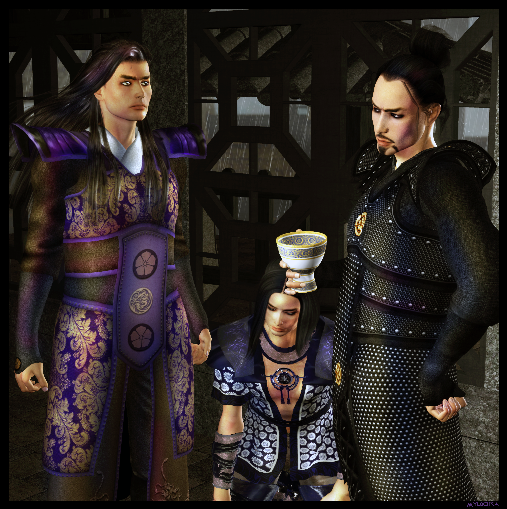
“Will the monkey’s persuasion be enough to bring Terumoto to heel?” Mitsuhide asked with, Ranmaru noted, a retroactive amount of caution.
“No,” was the great lord’s blunt reply. “Which is why you accompany him. Is such simple strategy beyond you, Mitsuhide?”
Again, the younger lord’s face darkened. “No, my lord, but it seems to have me speak to my associates there first might be a prudent step.”
Nobunaga gave a bark of laughter. “You sound like Ieyasu, boy,” he commented.
Mitsuhide bowed. “I am honored at the compliment, my lord.”
“I think such precaution is a waste of time,” Nobunaga stated. “But if you wish to pursue such folly, that is your decision. As long as the job gets done.” He started to turn, clearly dismissing the young lord, but Mitsuhide spoke again.
“Another matter, my lord. Why place lord Hideyoshi in command? I have the better grasp of battle tactics.”
“Which you will employ as he attempts to persuade Terumoto of his recklessness,” Nobunaga declared with a withering gaze.
There was a pause in which Ranmaru prayed Mitsuhide would drop the matter. His prayers went unanswered.
“Then you have no real intention of bringing him to heel with words alone,” Mitsuhide challenged, and again, Ranmaru had to stifle a gasp.
“Do you take your lord for such a fool, Akechi?” Nobunaga thundered. “Of course I have no real intention of bringing him to heel with words alone!” His tone was precise mockery of the young lord’s inflections. “Do you think I conquered the whole of Japan with words?”
“No, my lord…” Mitsuhide began.
“Of course you don’t,” the great lord continued. “You have been instrumental in that conquest, and your sword and spear are as bloodied as my own. Do not presume to lecture me on tactics, Akechi, until you hold my place!” He laughed. “Which will never happen. Now see to your men and prepare to obey my command before I find someone with more wit and less arrogance to replace you! Go!”
With a stiff and greatly overdone formal bow, Mitsuhide departed. Ranmaru quickly signaled to a servant, and more wine was brought for his lord. After draining the cup, Nobunaga threw it at the head of the servant. Ranmaru was rushing to the stables before his lord could snap out, “My horse!”
They rode fast and hard, as if the great lord could outrun the raindrops themselves. Nobunaga had not asked his valet to accompany him, but Ranmaru knew his lord’s mind and mood. Tsukinowake, Nobunaga’s favorite horse since his beloved Uzuki had grown old, responded to his rider’s urgings and Ranmaru’s own steed struggled to keep up.
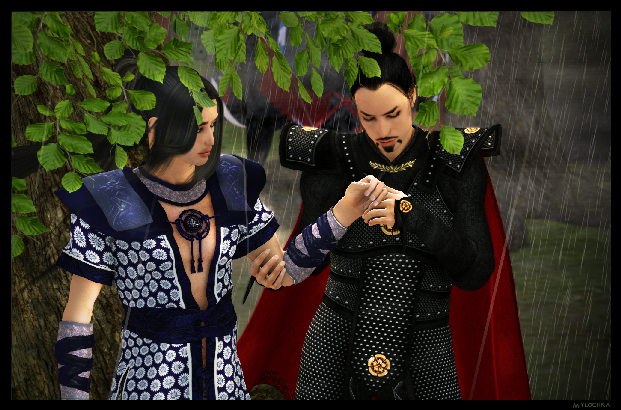
After more than an hour, Nobunaga finally slowed, stopping Tsukinowake under a small stand of trees. He dismounted and stood, his back to Ranmaru, staring up through the leaves. He had not donned riding gear, and his red under robe and black outer robe were drenched and sticking to his body, the rain glistening on his face and hair. Ranmaru grasped the flask of wine he had tied to his horse’s saddle and leapt down, bringing it to his lord. Nobunaga took it without a word, lifting it to his lips, then handed it back.
“Drink, Ranmaru,” he said, his voice hoarse.
The valet obeyed, then stood, inches behind his lord, letting the rain wash all the fury from his lord’s mind. After a long moment, Nobunaga sighed, his lean form losing some of its tension. With a hesitancy born not of unsurety but rather of anticipation, Ranmaru reached out, gently touching his lord’s back just at the place below the left shoulder blade.
“Perhaps the gods knew you would need the coolness of the rain today, my lord,” he murmured.
Nobunaga turned, grasping the boy’s hand so that Ranmaru would not lower it. “You think the gods know my needs as well as you do, my boy?” he answered.
“I think, my lord,” Ranmaru replied, gazing into Nobunaga’s eyes, “that the gods exist because you wish them to.”
“And I think, my Ranmaru,” Nobunaga returned, “that you were sent to me as the instrument of their existence.”
The great lord’s eyes never left his valet’s as he slowly brought the boy’s hand to his lips. At just the right moment, Ranmaru dropped his gaze and was pulled into Nobunaga’s rough embrace.
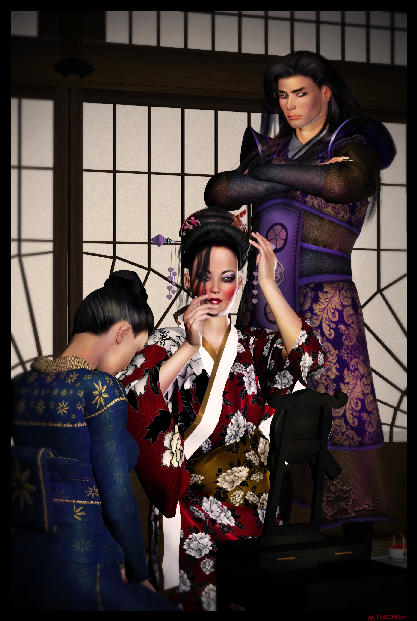
“I’m to go to Tottori to deal with that damned Terumoto,” Mitsuhide grumbled. He was pacing in the apartments of Lady Noh as she was having her maids change the ornaments in her hair.
“Mori is a brave man, and a smart one,” Noh replied. “It is said he has acquired cannon from the barbarians.”
“Huh,” Mitsuhide snorted. “Nobunaga has done the same.”
“His forces far outnumber Toyotomi’s,” the lady remarked, snapping her fan at one of her attendant’s clumsy fingers.
“But mine will be there as well,” the young lord pointed out.
“For a while, until the monkey can lay proper siege,” the lady returned offhandedly.
Mitsuhide narrowed his eyes. “If Terumoto lost Takamatsu, it would be quite a blow.”
“For a while,” Noh repeated. She glanced up briefly. “Our Lord Nobunaga will be traveling to Kyoto to meet with the Emperor before turning his full attention to the Mori.”
“I know,” Mitsuhide replied darkly. “He will bask in glory while I do all his work.”
“Tokugawa will not be accompanying him,” Noh continued. “He has matters to attend to in Mikawa, and will join our lord after the Court appearance.” She again glanced up, her gaze piercing.
Mitsuhide was silent for a long moment, then he asked, casually, “How many will accompany our lord to Kyoto?”
“No more than 30 or 40,” Noh answered. “Since our lord fully intends to turn directly to the western campaign afterwards, I will not be going with him either.”
“I see.” The two stared at each other for a very long time, then, with a quirk of a smile, Mitsuhide bowed and took his leave.
When he was gone, Noh dismissed her servants and started preparing a grieving eulogy for her lord husband.
Ranmaru rode ahead to instruct Kitsumo to have a hot bath ready for Lord Nobunaga. When the great lord arrived, he took extra care with Tsukinowake himself, insuring that the beautiful animal was dry and brushed and well fed before returning to the keep. He stripped his wet clothing off, draping it in front of a warm brazier to dry it, then retired to his room for hot tea and lunch before discreetly checking on his lord. Satisfied that Nobunaga was well in Kitsumo’s loving hands, he began preparing for the journey to Kyoto.
The preparation had taken months. The Emperor was an astute man, and had changed his mind about dates and places over and over again as the fortunes of the western campaign waxed and waned. Nobunaga raged when there were delays, taking out his frustration on everyone at court – except for Ranmaru. Even Kitsumo had to bear some of the brunt of his anger, which she always accepted with graceful humility. The messages from Hideyoshi were always cheerful, even when describing setbacks, and Nobunaga eventually roared at him via letter: “Blast that Tottori thing to pieces and get it over with before I have to come there and do it myself!”
Eventually the tide turned. Tottori was taken and Hideyoshi turned his attention to the last Mori stronghold, Takamatsu castle. The Emperor gave final agreement to the meeting in Kyoto and Nobunaga at last gave the order to leave Gifu the next morning.
That evening, he called Ranmaru to his private room and, without a word, handed him a small drum. Knowing what was coming, the valet nodded and took a place in a corner of the room as Nobunaga lit incense and took up his fan. The great lord was an accomplished performer, and this ritual was one of great significance to him.
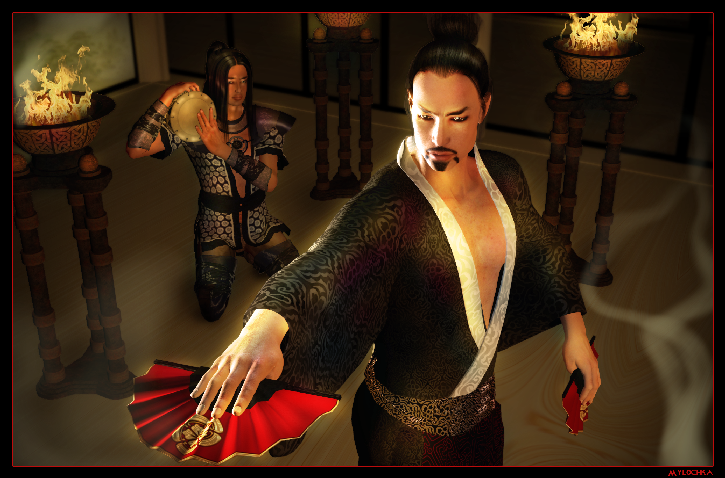
Ranmaru set a slow, strong tempo, and soon, Nobunaga began the graceful, stylized steps and gestures of his favorite song, Atsumori, the Warrior Hymn. His voice was deep and strong as he sang, each note as perfect as his movements:
“Ningen Gojuunen,
Geten no uchi wo kurabureba,
yumemaboroshi no gotokunari.
Hitotabi sei wo ete,
metsusenu mono no
arubekika?”“A man's life of 50 years under the sky
is nothing compared to
the age of this world.
Life is but a fleeting dream, an illusion --
Is there anything that lasts forever?”
Ranmaru felt a shiver run down his spine. He had witnessed this performance dozens of times, but this evening there was a prescient air about the great lord. The setting sun filtered in through the shuttered windows, lighting the smoke from the incense into almost eerie swirls, the movement of his lord’s fan sending it dancing around him. As hard as Ranmaru tried, he couldn’t shake the feeling of dread, even as the peace and beauty of the song calmed his lord’s mind and quieted all the conflicts within him.
Perhaps, Ranmaru told himself, it is only the coincidence of my lord’s years – for Lord Oda Nobunaga would turn 50 in a matter of days.
The song reached its end, and Nobunaga took a deep breath, then turned and smiled at his valet.
“Excellent, my boy,” he said.
Ranmaru bowed, and went eagerly to his lord’s embrace, but the fearful premonition remained.
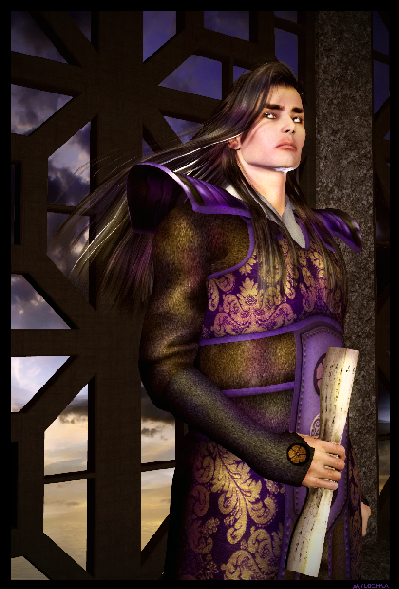
It was the final straw, the last insult Akechi Mitsuhide would ever take from Oda Nobunaga.
He clutched the message in his fist, shaking with rage.
After the victory at Tottori, he had traveled to his own lands to replenish his forces and supplies, prepared to return to the western provinces when Tokugawa arrived after his consultation with the great lord in Kyoto. His strategies had proven successful, his prowess in the last months of battles unquestioned. Yet Nobunaga saw nothing of it. Hideyoshi took credit for each and every victory. And now, this new affront, this latest snub and slur on his very character.
The message was terse, covered in disdain:
You can be a more effective backup if you march directly from your own province in the next few days, so you'll get there before I do.
When you arrive, wait for further orders from Hideyoshi.
He was to wait for further orders from Hideyoshi! After all his work, he was still considered secondary to a dancing monkey, a gibbering, optimistic fool who took advantage of others’ skill while he employed his ridiculous notions of negotiation. This fatherless, classless peasant who Nobunaga saw fit to elevate above all the rest of his generals, above the Akechi!
No. It would not go unanswered. Not this time.
The words of his last conversation with the much beleaguered Lady Noh came back to his thoughts:
“Tokugawa will not be accompanying him. He has matters to attend to in Mikawa, and will join our lord after the Court appearance.”
And no more than 30 or 40 will accompany Nobunaga to Kyoto.
A small force, mostly servants and toadies. There would never be a better time, a more advantageous opportunity.
Mitsuhide straightened, throwing the parchment to the floor. He called for his generals. It was time for the Akechi to act.
It was nearing sunset when Nobunaga and his small entourage arrived in Kyoto. A messenger met him, telling him all was prepared at Azuchi castle.
The great lord sighed. “Must I stay at Azuchi?” he replied. After months of leisure, he was tired of the splendor of castles, and dreaded even the luxury of his greatest architectural achievement.
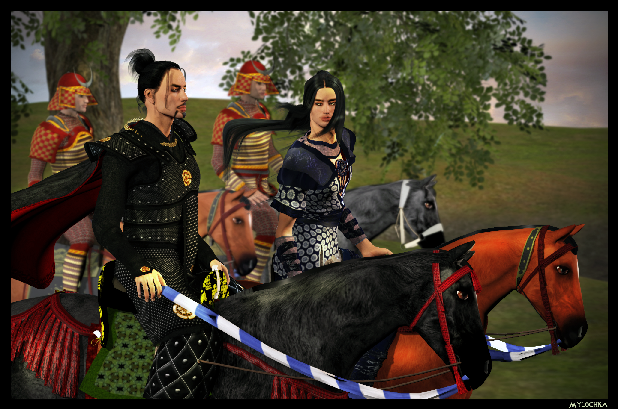
“There is Honnoji, my lord,” Ranmaru suggested quietly. He hoped that lord Mitsuhide’s taunts would not cause the mention of the place to rouse Lord Nobunaga’s ire.
“A temple, hmm?” Nobunaga replied, then nodded decisively. “Yes. Tell the monks to prepare to receive us,” he told the messenger, then turned to his valet. “Send invitations to the local merchants, and be certain to include Imai Sokyu and his son. He has new tea sets I wish to see. They will dine with me this evening.”
“Yes, my lord,” Ranmaru said. He gave instruction to the lord’s newest servants, his own younger brothers, Nagataka and Nagouji, and sent the boys on their way. As he watched them ride into the city, he heard Nobunaga’s faint chuckle.
“My lord?” he enquired.
“Do you worry, Ranmaru,” the great lord asked, “that I will find your brothers as pleasing as I find you?”
“Worry, my lord?” the valet replied. “It is my greatest wish that they please you in all things.”
“Is it, Ranmaru?” Nobunaga returned, his dark eyes gleaming with mirth. “It is truly?”
The valet flushed. “You tease me, Lord Nobunaga,” he said, his embarrassment matched by his humility.
The great lord laughed. “Yes, I do. For who could possibly serve me half as well as you?”
The evening passed most enjoyably. Nobunaga sat with his guests and discussed all manner of trivial and pleasant things, from the tea sets he wished to purchase – one in particular for Hideyoshi – to foreign trade goods to local gossip. Nobunaga’s son, Nobutada arrived with the great lord’s younger brother, Nobutoshi, and they joked with Sokyu, who was the Oda family’s main importer, asking if he could obtain any of the European cakes and tarts that Nobunaga so loved. Nobunaga laughed with good honor at the remarks, for it was well known that he was, as his son said, a ‘maniac’ for the treats.
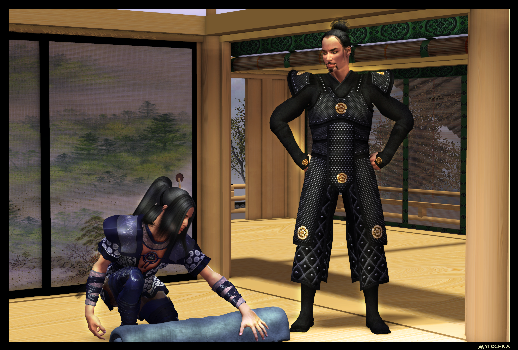
“Ah, if only I could wait for them,” he replied. “But I have to ride from Kyoto to the western provinces and help Hideyoshi finish this damned campaign.” He nodded to the merchant. “Perhaps then I can join you on one of your journeys. I would be most interested in seeing the means by which the barbarians produce their wonderful weaponry.”
“I’m certain such a journey can be arranged, my lord,” Sokyu promised.
The talk continued for hours and it was past midnight when Nobunaga finally signaled to Ranmaru that the evening was at an end. Bows and farewells were exchanged, Nobutada and Nobutoshi returning to the Oda Nijo castle, Sokyu and his son to their own home. Ranmaru laid down his lord’s futon and pillow in the bedroom that the monks had provided, preparing to set up his own just outside the wooden door.
Nobunaga stopped him.
“Stay with me, Ranmaru,” he said softly. “Once we ride to Miko, there will be little time for pleasantries.”
Ranmaru bent his head, overwhelmed by the warmth in his lord’s voice.
“I am always at your side, my lord,” he returned.
Nobunaga smiled. “Yes. I know.”
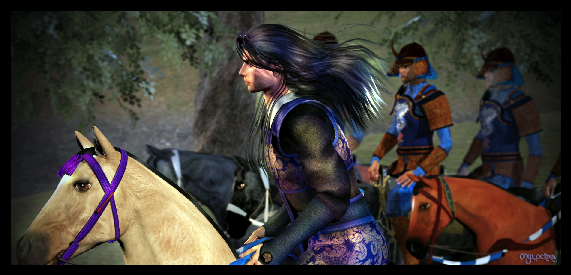
No one questioned the Akechi troops as they rode into Kyoto just before dawn. It was simply assumed that the general would meet with his lord before returning to the western provinces. The questions that arose when the Akechi men began rounding up every farmer and peasant outside the city were answered with arrows or spears or swords. Mitsuhide was drawing a cordon around the city, ensuring that no messenger could escape to warn any of Nobunaga’s other generals of what was to occur. Not even the Akechi troops had known what Mitsuhide planned – his own under-generals had been sworn to secrecy and were even now surrounded by assassins lest they try to change their minds.
A contingency was placed on the road from Mikawa, waiting for Tokugawa Ieyasu, for Mitsuhide planned to get him out of the way as well. But he hadn’t reckoned on the Koga ninjas, on Hattori Hanzo.
The Tokugawa camp was ready for their final march into Kyoto. Ieyasu was already astride his horse at the head of the large procession He was to rendezvous with Nobunaga after the lord’s appearance at the Imperial court, and ride with him to the western provinces. Ieyasu was in a cautiously optimistic mood. The reports from Hideyoshi were good. It seemed that with this one final push, the western Mori would at last be subdued, and the triumph of Nobunaga over the whole of Japan would be complete. Then, Ieyasu knew, the great lord would turn to him for the strategies necessary to govern. At long last, the unification Ieyasu so greatly desired would be at hand, and the land would know peace.
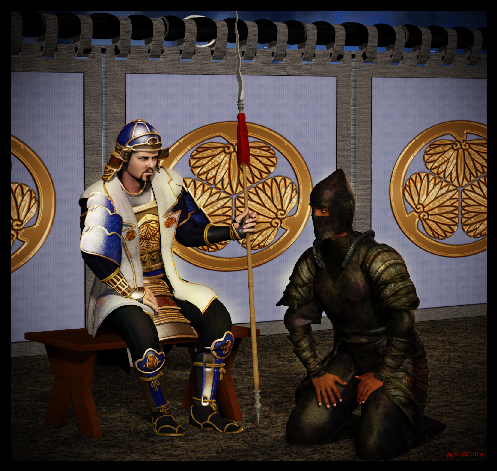
But in the bright morning, a flash of darkness came into his vision. The black-clad messenger went straight to Hattori Hanzo, the leader of the Koga ninjas who were Ieyasu’s bodyguards and main force of personal protection. After a brief conversation, Hanzo turned to his lord.
“We cannot go to Kyoto,” he said. “Akechi has the city surrounded.”
Ieyasu’s eyes went wide. “Nobunaga!?” he gasped.
“Is lost, my lord,” Hanzo replied. “Akechi has set fire to Honnoji, where Lord Nobunaga rests. There is no way in or out. My man barely escaped with his life. Akechi is killing anyone who dares to oppose him.”
“My lord!” one of the generals called. “An army approaches!”
“Quickly, my lord,” Hanzo insisted. “We must return to Mikawa. It is the only place we can guarantee your safety.”
Ieyasu’s quick mind assessed the situation. He ordered his men to fight, and turned his own horse away from the coming battle. It was not cowardice. He longed to run his sword through Mitsuhide’s treacherous body himself, but that would not be accomplished if he were slaughtered here. He followed Hanzo and the other ninjas, riding at a breakneck speed back to Mikawa – and revenge.
Murai Nagato, the governor of Kyoto, was awakened by the sounds of fighting. Sill bleary from his drinking of the night before, he roused himself and asked his guard what was going on. The man snorted and shook his head.
“Drunken ronin,” he answered.
The governor nodded and went back to bed.
Nobunaga woke early, as was his habit. He rose from his futon, smiling down at Ranmaru, who immediately came awake.
“Come, my boy,” he said, “we have a long, tedious day ahead of us.”
The valet sat up and began rolling up the bedding as Nobunaga went to wash and dress for the day.
Mitsuhide’s men fought their way to Honnoji, killing anyone who got in their way. At Nijo, Nobutada heard the commotion and ordered messengers be sent to his father and to Ieyasu, only to see them slaughtered before they could even make it out of the castle. Battles were fought, but the Akechi troops far outnumbered the Oda retinue. Nobutada watched in horror as, several streets away, flames rose into the morning light.
Honnoji was burning.
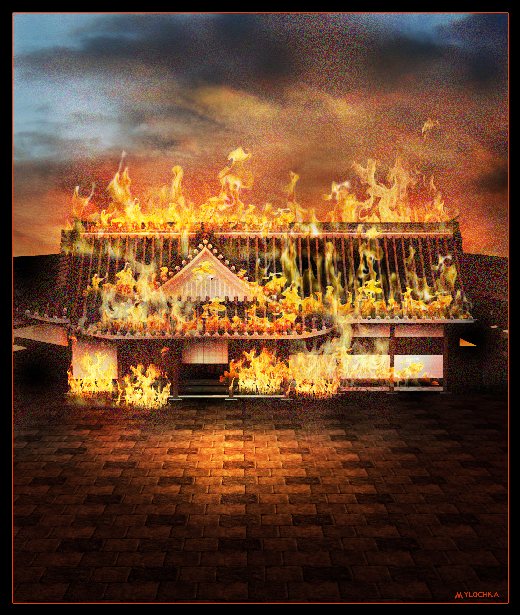
Honnoji was burning. Imai Sokyu shuttered himself and his family in their home and sent messengers out of the city. He was certain Nobunaga would be doing the same, but was equally certain the Akechi men would detain or kill any that were known to be of the Oda. His own messengers would not be so burdened. He gave then him best horses, and told them to get out any way they could, and to ride to Ieyasu – and to Hideyoshi.
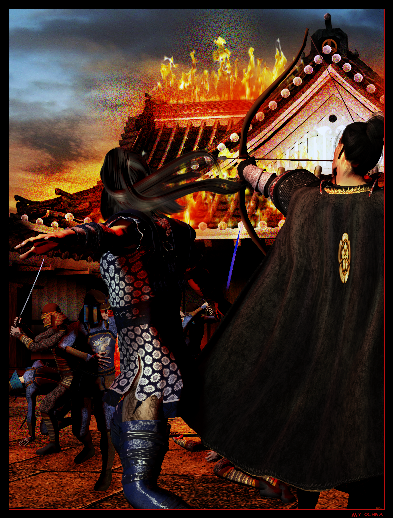
Ranmaru gazed out the window of the small room he had shared with Lord Nobunaga. There were men riding up to Honnoji, as bold as they could be, each carrying a torch.
“My lord!” Ranmaru shouted, and quickly went to his pack, drawing out his sword.
Nobunaga rushed in from the corridor, hissing one word. “Akechi!”
Then all hell broke loose as fire rushed up the side of Honno temple.
There were flames and soot and ash everywhere. Men poured into Honnoji, killing the monks, peppering the air with arrows. Mitsuhide’s voice could be heard, demanding that no one escape alive. Nobunaga and Ranmaru battled for their lives, the great lord using the Akechi’s own arrows to fire back while Ranmaru slashed at them with his blade. Each time a wave was beaten back, a new assault would begin.
And the fire came closer.
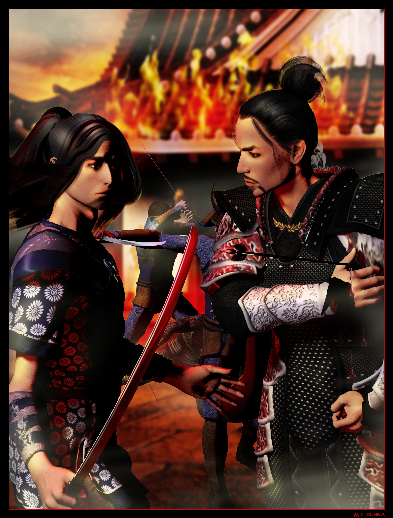
For hours they fought until smoke filled the rooms. Nobunaga could no longer see to aim his bow. Ranmaru bled from strikes to his arms and side, his face smudged with sweat and soot. At a cry from Nobunaga, he turned. And arrow had pierced his shoulder, nearly pinning him to the wall.
“My lord!” Ranmaru cried.
His lord’s face grew determined.
“None of the Akechi will have my head,” he growled. He drew himself up, dropping the bow, his eyes piercing into Ranmaru’s own. “I retire now, my boy,” he said. “When I am gone, burn these rooms.”
“My lord, please…” the valet gasped.
Nobunaga held up his hand. “No, Ranmaru. I have time for just this final act. I will not be defeated by any hand save my own.”
Grief burned in Ranmaru’s heart. “Help will come, my lord, please…!”
“NO!” Nobunaga barked, then he winced, but his gaze softened. “Is there anything that lasts forever, my boy?” He smiled, then turned and headed into the bedroom he had shared with his beloved valet. “Hold them off until I am gone, Ranmaru. Then, I ask you, join me.”
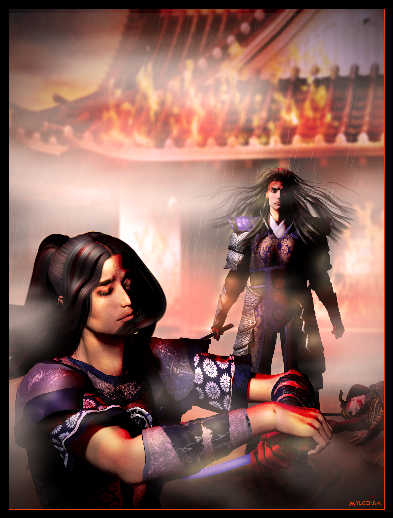
Tears welled in Ranmaru’s eyes and he blinked them away. “I am always with you, my lord,” he said.
Nobunaga walked into the bedroom, closing the heavy wooden door, and Ranmaru turned to face the onslaught .
He fought like one possessed. He paid no heed to the arrows that found him, nor to the blades that sliced through his clothing and skin. He killed more than a dozen, keeping them from Nobunaga with every breath, every blow. Akechi would claim no victory, his triumph would be a hollow one. He would not best Oda Nobunaga.
From inside the bedroom he heard his lord’s final shout, a roar of defiance and contempt as well as one last command to his valet.
“No regrets!”
Ranmaru strained to hear the thump of Nobunaga’s falling body, picturing the blade that was slicing the great lord’s abdomen. When it came, he grabbed an oil lantern, dashing it against the door to the bedroom. The heat of the room and the sparks that fell around him ignited it, sending up an inferno between him and his lord. The smoke thickened and Ranmaru fell to his knees. He glanced up to see Mitsuhide approaching through the flames.
“No regrets,” he whispered, and plunged the blade of his sword into his own belly.
No regrets!
The words echoed in Sulu’s thoughts as he roused himself from his daydream. He pictured the burned, half-dead messenger arriving at Hideyoshi’s camp, dying even as he gave the general the terrible news. He imagined Hideyoshi’s grief and rage, and the immediate march to avenge his lord, though by custom it was not his place. Japanese culture dictated that only relatives could take such vengeance, but Hideyoshi had flaunted that convention, finding and killing Akechi Mitsuhide less than two weeks later. Akechi had ‘ruled’ Japan for only 13 days. Hideyoshi’s own rule lasted only 17 years. At his death, Tokugawa Ieyasu conquered what was left of his clan and rose to the shogunate, perhaps the most famous of all Japan’s feudal rulers and the last of the ‘Unifiers.’
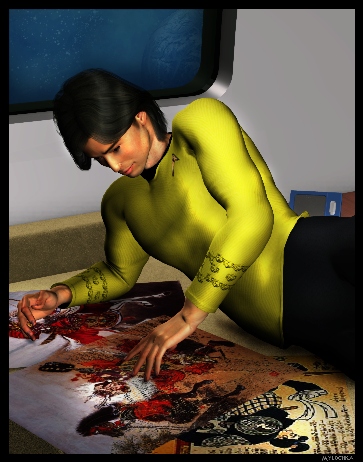
Sulu’s reverie had not been completely accurate to history, he knew. For one thing, Lady Kitsumo had died when Ranmaru was only three, and Nobunaga hadn’t even met the boy until he was six. But his romantic nature could hardly leave her out of any ruminations involving Nobunaga: she was, by all accounts, the love of the great lord’s life. And there was no real indication that Noh had been at all involved in the plot that took her husband’s death, though she was reputed to have been a spy and an assassin. And there were many details that, of course, simply could not be known.
Sulu had to shake his head at the fanciful casting his mind had done. He was certain Jade Han and Jeremy would find it most interesting – if he had any intention of telling either of them about it. He did wonder at the absence of Jilla in the reverie – but then, thoughts of her were rather focused on the exquisitely painful of late, and the only romantic character in his little mind-play had been Kitsumo, and he had no intention of casting Jilla in the role of the love of anyone’s life but his own.
He sighed, and carefully re-rolled the prints, making a note to ask Maintenance to have them framed. Shingen would, he thought, go in his office, something no one would question since his name was Takeda. But Ranmaru and Nobunaga would go in his cabin. They had to be displayed together, and he would just as soon not have to answer questions about them. The inevitable teasing would, in his present condition – which was going to continue for long months more – simply be too much to bear.
To go to the next story in chronological sequence, click here